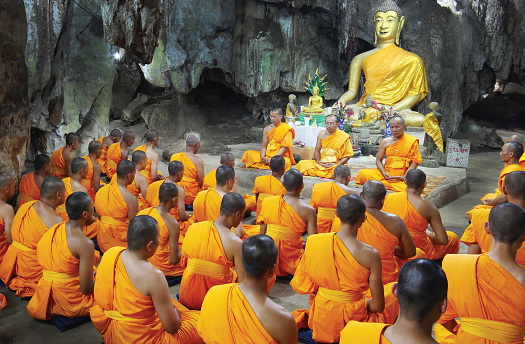Introduction

Ordination is an essential part of life for all male 'Buddhists. The individual cuitwates merit that carries over into the next life and receives many benefits for his present life. Furthermore, he gains Iqiowledge, wisdom, a greater understanding of the world, both socially and economically as well as physical, mental and spiritual well-being. Those who are ordained are not merely individuals who shave their heads and wear monks' robes, they must train, practice, and embody the teachings of Lord Buddha.
There are 227 precepts, which include rules, regulations, and traditions that serve as guidelines for those who are ordained. The precepts are tools that help define the differences between right and wrong, good and evil. They help to strengthen the individual's determination in facing life's challenges by instilling mindfulness, patience and purpose in life. These precepts are guarantees for the future, whether the individual subsequently chooses the path of the lay world, or that of the ordained monk.The knowledge learned during ordination will not be wasted or serve to harm others.
The strict study of Dhamma, in both theory and practice, lifts the individual's consciousness to a higher level, so that he may know truth and goodness, to attain spiritual goals. The truths that the teachings embody will guide the individual towards a life of self - sacrifice for the benefit of all.
Consequently, ordination is not only an important rite of passage, but also a necessary path taken by all those who seek to lead and guide their fellow man. This truth transcends past, present and future.
In an essay that was awarded first class honours during the annual Visakha Puja Day writing competition in the year 1960, entitled, "The Kings of Thailand and Buddhism." The author Tinakorn Tongsevatu writes on pages 128 -129"Ordination during the time of Ayuddhaya, consisted largely of those who had faith in the ritual only. However, later on it became a tradition that all males should be ordained for it was a part of education during the reign of King Paramakosa which began in 1732." Those who sought government service had to have already undergone ordination before His Majesty granted titles. Therefore, civil servants of that period were all ordained, and sought to encourage their male children to be ordained as well, upon coming of age. All male members of the royal family also had to undergo a period of ordination.'
This tradition continued until the Ratanakosintra Period, when there was an expansion of the education system towards a more Western approach. This new direction in education caused people to believe that knowledge in the western sciences and worldly affairs were enough, and that further study of the Dhamma was no longer necessary.
Until World War II, the number of people who studied abroad increased steadily. An increase in the educated population of Thailand reflected this. The rapid expansion of curricula towards the sciences and all things modern caused many people to forget the Dhamma Favouritism grew in certain government and education circles for those who studied abroad, and who brought with them new-thoughts and ideas. All these led the people to believe that the Dhamma was a relic of times past, something that is no longer relevant to modern life. The nature of change meant that those who practiced Dhamma, and lived a life of virtue were abnormal, whereas those whose lives were untouched by faith became increasingly normal.
The trend continues to this day. It is widely believed that those who believe in the Dhamma and who live their lives by its teachings, are not able to compete and succeed in the real world.
This belief encouraged those well versed in new ideas and knowledge, but lacking morals instilled by the Dhamma, to take advantage of others for selfish gain. These people sabotaged the economic and social growth of our country, steering it away from a brighter future.
These misfortunes transpired because Thai people turned away from the teachings that their forefathers had instilled for many generations.Nevertheless, as time
Wat Phra Dhammakaya was established to earning on the legacy handed down to us by our forefathers. Its founding saw the planting of a seed of hope for future generations, so that they might find not only worldly knowledge, but also truth and the wisdom of Lord Buddha.
It is gratifying to see that young students and lay people are becoming increasingly interested in studying and practicing meditation. Although it is still only a fraction of all those of Buddhist faith, this growing interest does much to strengthen the resolve of not only monks, but all those who seek to guide and spread the teaching of Dhamma Near after year.1have lectured on the topic of ordination and its benefits many times, and in many places. That is why I have asked the
Education Department of Wat Phra Dhammakaya to compile my lectures so that it may be useful in the training of monks and novices on their duties and responsibilities. The result of this is publication you hold in your hands today. This book represents the first step on the path towards finding the Dhamma within you. It begins with an introduction to the importance and the benefits of ordination, so that those who choose to be ordained may understand all that it entails. It also prepares the individual, both spiritually and physically, so that he may one day become a person worthy of being at one with the Dhamma.
Phrabhavanaviriyakh (Phra Phadet Dattajeevo)



